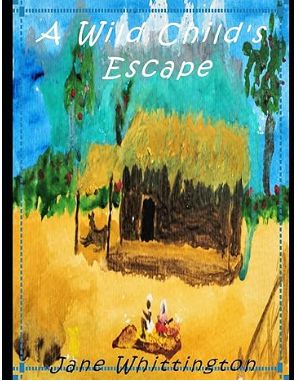 A Wild Child's Escape
A Wild Child's Escape
by Jane Whittington
Blurbs: This is a true story. It illustrates how a young woman, Jane, gets involved in the dynamic changes happening in the 1960s, and how she gets immersed in a new way of living. She follows the 'hippy trail' to Nepal where she lives with a Nepalese family in their mud hut, and becomes part of the family, fetching water, wood etc., and gaining an insight into living with nature as all cultures did at one time. On her return to the UK, Jane gets involved with an Eastern Cult. The book intimates Jane's mental health difficulties and how these extreme ventures exacerbate her stability even more. It is a frank look at the stark changes of the time and an insight into mental health difficulties and how Jane overcomes these obstacles.
I started reading this book one afternoon and I read it all the way through in one sitting. I quickly decided to skip the early section on her pre-DLM days of drugs, dropping out and going on the "hippie-trail." There may be some skilled raconteurs who can make this interesting but usually they're smug and boring. But I quickly realised this one was different, Jane Whittington seems to have been the unhappiest, the most confused and the unluckiest young woman of the 60s and met only the nastiest, most selfish, "spoiled children" pseudo-hippies (is there a difference between a hippie and a pseudo-hippie?) on the face of this earth.
On her return to England, despite all her ambivalence and doubts she began going to satsang and finally "received Knowledge" from Gurucharanand in an explosion of bliss and devotion rarely topped in premie tales. I knew the blurb made it obvious this was not going to be bliss all the way up but I was truly shocked by just how awful she describes her life and just how awful nearly all the premies she interacts with are. I think there was a brief positive mention of Mike Finch, who might have been the un-named organiser in Exeter but all the rest seem abominable.
I did have a brief desire to meet Deirdre, the Circe of English premies, who ran off with half the men in the book at different times and turned them into pigs it they weren't already.
The title of the book is inappropriate. By the time Jane W. exits she is no "wild child" but a prematurely aged woman worn down by single motherhood and bad relationships who got through life on the support of the British government, the remnants of the family fortune, some emotional support from other women premies and the pie in the sky bliss of seeing Maharaji at festivals, programs and events.
This bliss quickly fizzled out but it did leave me wondering whether her life may have been even worse without her brief Maharaji blissouts or might she have come to an accommodation with life much earlier had she never been attracted by the surface appearance of 1970s DLM satsangs and then living the dysfunctional premie lifestyle.
I do not recommend this book to anyone. It is very depressing. It does provide a picture of premie/PWK life without any rosy tinted glasses and I confess I recalled some women and children (and men) with some similarities in DLM and EV in the sunnier, warmer, less poverty stricken Australia of the 70s and 80s.
Jane’s life improved vastly after leaving the Mission. She was never rich and was a grandmother by the time she had worked through all this, but she had purpose, work and a sense of achievement in overcoming all that she had been through. She worked helping others who had suffered the same kind of abuse and exploitation.
Once the 80's rolled on and Divine Light Mission became Elan Vital there was no longer a pretense of ascetic bliss and peace through meditation but an arrogant attitude that these losers were somehow special through their tenuous association with Maharaj Ji, their secret God.
Life in DLM England appears gray, rainy and desolate. The men are sexist, lazy and try to rape a 12 year old girl if it's at all possible and the women are depressed, angry and controlled.
I'm sure there were wealthy, happy English premies who enjoyed themselves and very sensibly kept well away from the premie underclass. At least, I hope these stories came from a premie underclass of bongos and are not indicative of the majority of members of Divine Light Mission.